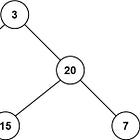Problem 47 - Largest Number At Least Twice of Others
Explore our archive for previous posts.
Question
You are given an integer array nums where the largest integer is unique.
Determine whether the largest element in the array is at least twice as much as every other number in the array. If it is, return the index of the largest element, or return -1 otherwise.
Example 1:
Input: nums = [3,6,1,0]
Output: 1
Explanation: 6 is the largest integer.
For every other number in the array x, 6 is at least twice as big as x.
The index of value 6 is 1, so we return 1.Example 2:
Input: nums = [1,2,3,4]
Output: -1
Explanation: 4 is less than twice the value of 3, so we return -1.Constraints:
2 <= nums.length <= 500 <= nums[i] <= 100The largest element in
numsis unique.
Approach
Here's a high-level approach to solving this problem:
Find the Maximum and Second Maximum:
Iterate through the array to find the maximum element (
maxNum) and keep track of its index.Simultaneously, find the second maximum element (
secondMaxNum).
Check the Condition:
Check if
maxNumis at least twice as much assecondMaxNum.If it is, return the index of
maxNum; otherwise, return -1.
Solution
Solve it here
public class LargestNumberTwice {
public int dominantIndex(int[] nums) {
// Check if the array has fewer than two elements
if (nums == null || nums.length < 2) {
return 0;
}
// Initialize variables to keep track of the maximum and second maximum
int maxIndex = 0;
int maxNum = nums[0];
int secondMaxNum = Integer.MIN_VALUE;
// Iterate through the array to find the maximum and second maximum
for (int i = 1; i < nums.length; i++) {
if (nums[i] > maxNum) {
// Update secondMaxNum and maxNum if nums[i] is greater than maxNum
secondMaxNum = maxNum;
maxNum = nums[i];
maxIndex = i; // Update the index of the maximum element
} else if (nums[i] > secondMaxNum) {
// Update secondMaxNum if nums[i] is greater than the current secondMaxNum
secondMaxNum = nums[i];
}
}
// Check the condition for the largest number being at least twice of others
return (maxNum >= 2 * secondMaxNum) ? maxIndex : -1;
}
}Time and space complexity
Time Complexity: The algorithm iterates through the array once, so the time complexity is O(n), where n is the length of the array.
Space Complexity: The algorithm uses a constant amount of extra space, regardless of the input size. Therefore, the space complexity is O(1).
Explore more?
Missed a previous edition? Catch up on the insightful content you might have missed by visiting our archive here. Thank you for being a valued reader of our newsletter. We appreciate your continued support!




